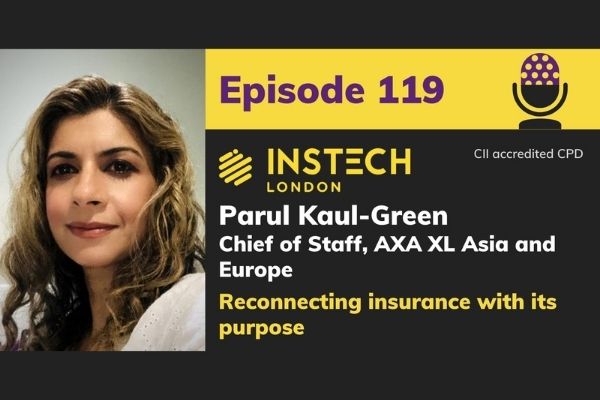This week we’re hearing from a well-known leader from one of the largest global speciality insurers, AXA XL and someone who always provides a refreshing perspective on what is happening around us.
The core purpose of insurance is to provide a safety net for customers. As the industry looks at improving its own efficiency, is it at risk of losing sight of that purpose?
Robin Merttens is this week’s host, and our guest is Parul Kaul-Green, Chief of Staff, AXA XL Asia and Europe.
Talking points include:
- The importance of context in digital transformation
- What commercial teams can learn from the consumer side
- Accelerating disruption to meet Covid challenges
- Becoming a true partner to the customer
- Tackling the industry’s diversity issues
If you like what you’re hearing, please leave us a review on whichever platform you use, or contact Matthew Grant on LinkedIn.
Sign up to our newsletter for a fresh view on the world every Wednesday morning.
Reconnecting insurance with its purpose – Episode 119 highlights
Robin: Parul, we always work on the basis that no-one chooses to have a career in insurance. You started in asset management, so did you decide that financial services was the place for you?
Parul: No, not really. I wanted to be a filmmaker, a creative person who made movies with songs, dancing and improbable plotlines.
I finished business school and got into Citigroup through their Global Executive Management Associate Programme. It seemed quite an attractive career path because they set me up in various departments. That’s how I got into banking and financial services.
Robin: You moved into insurance with Aviva and worked in strategy and innovation teams. Was it the company that attracted you or the nature of the role?
Parul: By that stage, I’d done five years in private equity and co-founded a start-up to create a cheque tech giant in mobile wallets. It didn’t work out, but the VC that funded it said I had a financial services background and would I like to join them. I worked in investment in some very interesting areas and then moved to a corporate development strategy role in Aviva Investors, which is the asset management part of the Aviva Group.
Robin: Having done a start-up is what makes you one of us. I’ve always seen you as a natural innovator with some empathy for what it’s like, and that’s what led you to AXA Next, the retail and consumer innovation lab. What is AXA Next trying to achieve?
Parul: AXA Next is the group’s innovation business unit and has built an ecosystem of start-ups and technology projects. What it’s trying to deliver is AXA’s transformation by delivering new products and services for customers and partners. The whole ethos is not insurance but accelerating the transformation of insurance to make it ready for the future and more customer-centric.
Robin: And then recently you’ve moved into the commercial arm and become Chief of Staff at AXA XL for Europe and Asia. What opportunity did you see in that role?
Parul: What I realised working within group innovation is that we sometimes miss the nuance of running a book live while we are transforming a business. The context becomes a bit obscured, which is why when the pandemic started there was an opportunity to look at innovation to solve the immediate problem of lockdown-led distress.
AXA XL was a very ripe candidate for looking at how to transform the business using thinking from the rest of the group and other parts of the financial ecosystem. I saw the role as a very influential way of making an impact on the business.
Robin: The commercial side can learn a lot from the consumer side. Are you taking learnings from the Next Lab role into your current one?
Parul: Absolutely. One of the things retail is very good at is managing relationships at a mass scale, which means they don’t even pretend to do it through just human beings. Businesses find it much easier to have data-led insights, and input alternative data sets into their pricing models, because there’s no way to reach a mass-market using just a human interface. Omnichannel is slowly emerging in commercial insurance, and lockdowns have made people realise the shortcomings of the current model.
It’s not about taking away the human impact, but augmenting it by using technology to allow customers, or in this case companies and brokers, to interact more conveniently with us. That is a big difference between commercial and retail, which commercial could learn from.
Robin: What can we expect to happen in the insurance industry in 2021?
Parul: First and foremost, there is a huge emphasis on the digitisation of workflow solutions. That has accelerated in all industries, including those that have been slow to adopt technology like insurance. Then I see technology teams that have accelerated disruption during the pandemic through contactless payments, increased use of workplace collaboration, and automation through the supply chain.
Being able to digitally connect employees and customers has been fast-tracked to the point of no return. Everybody’s looking at public cloud solutions and e-commerce as the dominant way of doing business, so those are the three themes becoming stronger in our industry.
Robin: There’s much to do, but if you could pick one thing that would make the industry fundamentally better, what would it be?
Parul: There is a really strong need within our industry to align with our purpose. When I speak to some commercial insurers, they say “We are underwriting-led. Our business is to underwrite risk well.” I want to bring their purpose back to being consumer-led. Led by the need to provide safety for clients, big and small corporations, so they can continue manufacturing, building and even trading after an adverse event.
If we realign with that, a lot of our thinking would be more focused, and we would be able to do much better for our customers as well.
Robin: That involves more than just paying losses doesn’t it? We need to sit on the shoulder of our customers, rather than just being there in adversity.
Parul: We have to move away from just the provision of financial indemnity to partnering better with our customers. It could be telling them how to build the cyber resilience of their company, or how to make them more resilient to climate change. It could be nudging them towards better behaviour by introducing ESG factors into how we write financial indemnity and training them on adaption skills to prevent events occurring.
There is a lot of work that we could do in anticipation and prevention, which we don’t currently do with a well thought through strategy.
Robin: You do a lot of work outside of insurance. You’re very active in the mentoring space and the Mayor of London’s International Business Programme. What is your motivation for setting that time aside?
Parul: I’ve always aspired not to be defined by my job. That aspiration is driven from the desire to be a better human being, to make things better than I find them. Being able to make someone’s day or business better is a key driver for me.
I mentor a lot of start-ups to give young, aspiring entrepreneurs from non-traditional backgrounds my experience of being a strategic investor and a co-founder. I don’t have all the answers and I don’t pretend to, but I can listen and add some useful perspective.
Robin: I don’t do as much mentoring as you do, but I really enjoy it. It’s incredibly uplifting.
Parul: A lot of people say human beings are selfish, but that’s not right. Human beings are social animals and we’re driven by how we can make communities better, how we can be better human beings. It makes me feel that I should do more than just go to work, do as I’m told and not think about the broader picture. How can I make this better for a lot of people, not just a few within my organisation?
Robin: You’re also a big player in gender diversity in insurance. There’s a real acknowledgement now that the industry needs to face up to the issue. Are you happy with what’s being done? Are we doing enough?
Parul: The industry is doing better, but it’s not doing enough. When we look at the broader population of any of the countries we operate in, and when we see the composition of leadership, there is such a big delta. If we keep setting very small, incremental targets, like boards being 20% female in the next 10 years, we will never get there.
We need the moral courage to do more and do better, which is a passion of mine, and setting easy targets is not the way to go. Set targets which are aspirational and will make a difference.
Robin: If companies want to be innovative and encourage innovation, then they need a diverse and creative workforce. What are the simplest things insurance employers can do to move forward?
Parul: Don’t wait for regulations to come into place before doing the right thing. For example, when we introduce ESG factors and tell people to do better with their governance, we should also look at ourselves. Are we creating representative leadership? Do we have targets to make us more diverse, representative and equal? We keep relying on governments to force us into that position rather than doing it ourselves.
Robin: We’ve been a little bit critical of the industry, but I guess you’re in insurance because you enjoy it? What is it about insurance which makes you get up in the morning?
Parul: It’s the purpose of the industry. The ability to promote enterprise by telling people that they don’t need to be scared because we will have their back. Take risks, because risk and discomfort are how innovation progresses in any society. That role drives me, the social purpose of insurance to make things better and make people more cognizant of their actions by driving desirable behaviours.
This industry has many clever, kind and innovative people. We just need our collective effort to be more forceful. We need to stop thinking that someone else, government regulation, or technologists from Google and Apple will fix it for us. We’ve got to do it for ourselves.
Robin: How do you juggle everything? You have a big job as well as public speaking roles, mentoring and a busy family life. How do you get all that into one day?
Parul: It’s a lot of teamwork. There are a lot of people who help me maximise the way that I can make an impact in each of the areas I’m operating in. An individual can’t achieve everything they set out for if they don’t have help. Community, Robin, is helping me do all the things that I’m able to do.
Robin: That’s a very natural way of bringing us back to InsTech London. If you had one message to give to the InsTech London community, what would it be?
Parul: I would say that they’re doing an excellent job of bringing technology to insurance, making it accessible and explaining how it fits into our value chain. They’re doing it for the right industry, which has a big impact on our society, so well done.
Continuing Professional Development – Learning Objectives
InsTech London is accredited by The Chartered Insurance Institute (CII). By listening to an InsTech London podcast, or reading the accompanying transcript, you can claim up to 0.5 CPD hours towards the CII member CPD scheme.
- Claim 0.5 hours for listening to Episode 119 of the InsTech London Podcast






